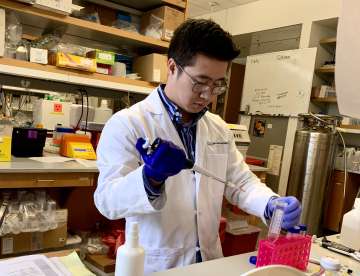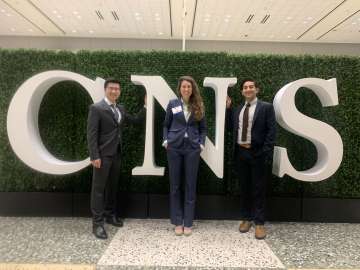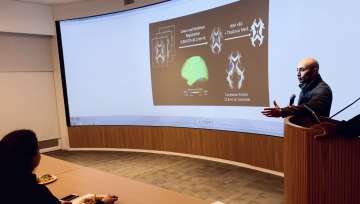Research Training

The UCLA Neurosurgery Residency Program seeks to train future neurosurgeons who will strive to extend the frontiers of knowledge, increasing our understanding of the brain and spine, and advancing treatments for a full range of neurological conditions. Accordingly, research training is one of the central pillars of this program and is centered around a longitudinal program to develop residents' research interest and capabilities.
Our aim is to provide an environment where residents can tailor their experience to individual interests and needs, with the end product being a resident fully prepared to excel in an academic career. Under the guidance of the Residency Research Committee, junior residents submit an R25 research proposal in preparation for one year of dedicated research time during the 4th year of training. Residents with modest research experience entering residency learn the fundamentals of scientific research. Other residents with a greater existing experience, including prior PhDs, utilize this opportunity to further enhance their research skills. Residents are supported to attend regional and national conferences and courses throughout their training.

The UCLA Neurosurgery Department is one of the top neurosurgery departments in the world in terms of total research funding, with over half of the clinical faculty receiving support of NIH grant support as principle investigators. Department laboratories include neurosurgical-oncology and neuro-immunology, spine and spinal cord injury, neurovascular, epilepsy and functional/neuromodulation, and neurotrauma. Residents can also elect to obtain their research experience outside of our department laboratories, taking advantage of any of the distinguished research faculty at the David Geffen School of Medicine or at the other world-class schoolsUCLA (i.e., Samueli School of Engineering, UCLA Anderson School of Management, etc.) or at the California Institute of Technology (Cal Tech). The research training provided results in proven academic successand the academic productivity of the UCLA residency program is ranked second highest in the country among all neurosurgical programs (Taylor et al., J Neurosurg 123:547–560, 2015).
Research activities by PGY and the R25 grant process
PGY1
- Explore research endeavors in department
- Orientation to R25 process
- Begin thinking about area of interest and potential mentors
PGY2
- Identify research mentor and write the preliminary research proposal
PGY3
- Finalize research plans and develop a grant proposal with research mentor
- Participate in the RUNN course
- Present research proposal to the Residency Research Committee for critique/approval followed by subsequent modifications as needed
- Complete an NIH R25 grant proposal for review by the Residency Research Committee
- Submit IRBs to Human Subject Protection Committee (or Animal Research Committee) for approval and complete all required laboratory safety training courses as needed
- Submit R25 proposal and any additional grant proposals
PGY4
- Conduct proposed research
- Complete mandatory bioethics course
PGY5/6
- Continue/complete analysis of conducted research with expected submission for peer-reviewed publication
- Consider applying for extension of R25
PGY7
- Transition to academic practice year may be used to continue funded research or begin an advanced degree
Alternative research experiences

For residents looking to expand upon or seek an alternative research experience, our residency program offers many alternatives, including but not limited to:
- Training at the UCLA Clinical and Translational Science Institute
- Masters degree in health policy training at the UCLA School of Public Health
- UCLA STAR Program, where selected residents can obtain a PhD during residency
- UCLA Biodesign Program